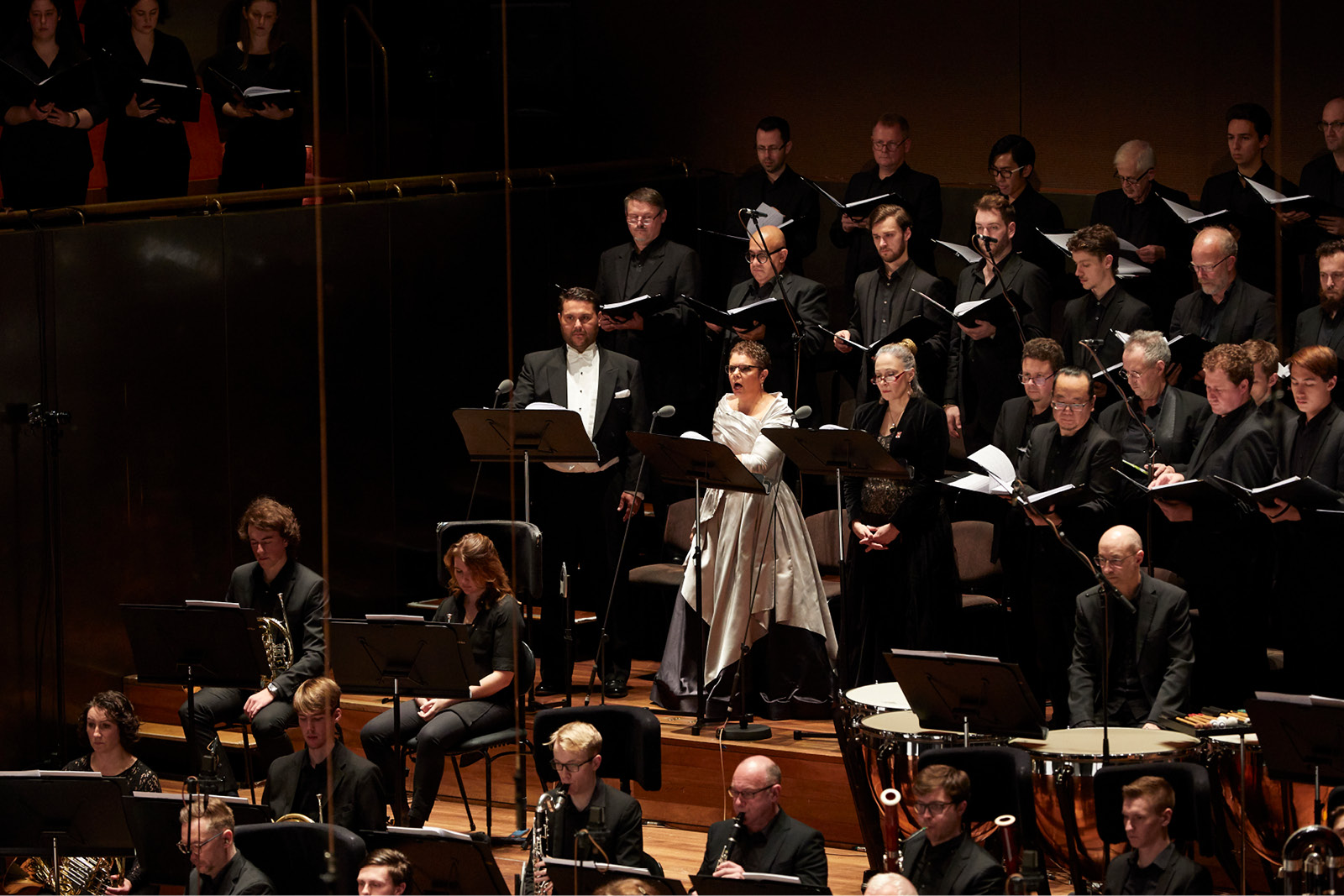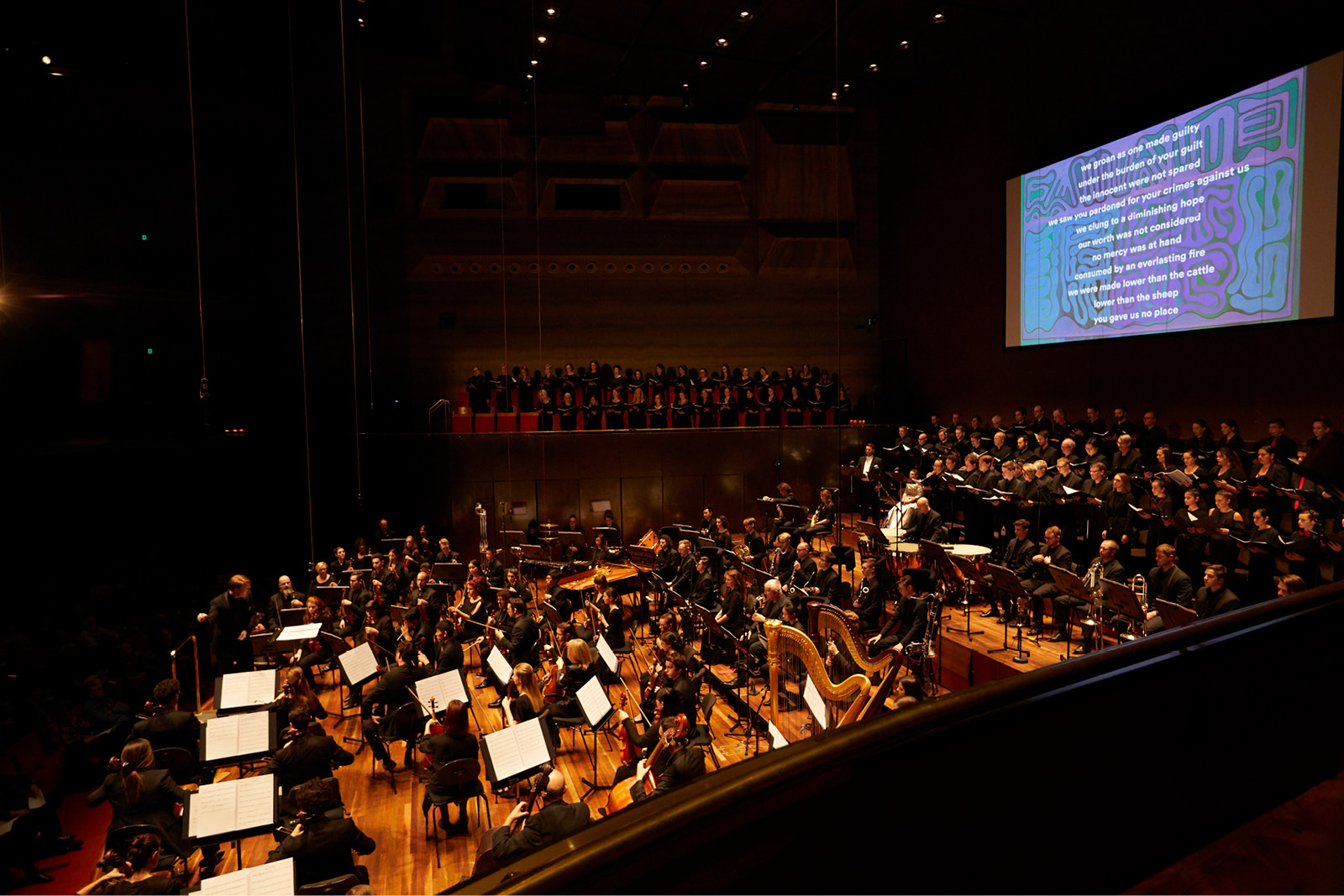Composer and soprano Deborah Cheetham has been an artistic and social pioneer in so many ways. A Yorta Yorta woman, she has advanced the cause of Indigenous music, particularly through her founding of Short Black Opera, which produced her first opera, Pecan Summer; and the establishment of the Dhungala Children’s Choir. Drawing these and many other threads together, she has created a profoundly symbolic work: Eumeralla: a war requiem for peace. Eumeralla is the name of one of the rivers that flow through Gunditjmara country in southwest Victoria. It was on this land some 170 years ago that war broke out between the traditional owners and new arrivals. Cheetham was deeply moved by a visit to this site in 2013, waking in her a musical response that was to become this war requiem, a work “designed for non-Indigenous Australians to sing alongside their Indigenous brothers and sisters.”
 Eumeralla. Photo © Laura Manariti
Eumeralla. Photo © Laura Manariti
Sung entirely in the dialects of the Gunditjmara people, the work takes its shape from the traditional Latin requiem, but as Cheetham observes, “the substance and spirituality needed to be taken further in order to honour 70,000 years of ceremony and the battles fought in defence of the longest continuing culture in the world.” This leads to some interesting glosses on the traditional text. For example, the original Tuba mirum and Mors stupebit translate as “The trumpet, spreading its wondrous sound through the tombs, will summon all before the throne. Death and nature will be stunned when creation shall rise and answer to the judge.” In Eumeralla this becomes “We heard an awful sound scattered across the burial places of our ancestors. We stood before the weapons. All nature was stunned (confounded) by the ugliness of mankind made ugly by ignorance.”
Art works specially commissioned of Gunditjmara/Yorta Yorta artist Tom Day were projected on a screen above the performers, sometimes carrying the English translation of the text. These were interspersed with video of the performers.
Given the gravity of its inspiration and the breadth of many other requiems, Eumeralla is conceived on a grand scale for large orchestra (including harps and piano), adult chorus, children’s choir and three soloists (soprano, mezzo-soprano and baritone). This performance was an excellent exercise in reconciliation and collaboration. The orchestra drew on the combined resources of the Melbourne Symphony, Melbourne Youth Orchestras and Masters degree students from the Melbourne Conservatorium of Music. The Melbourne Symphony Orchestra Chorus was joined by The Consort of Melbourne. Singing with the Dhungala Children’s Choir were members of the girls’ choir from St Paul’s Cathedral. Cheetham as soprano soloist was joined by two collaborators from Short Black Opera, Linda Barcan and Gungarri baritone Don Bemrose.
 Eumeralla. Photo © Laura Manariti
Eumeralla. Photo © Laura Manariti
Lasting about 70 minutes, the work is in 19 movements, sung without a break. While having large orchestral forces at her disposal, Cheetham uses them, for the most part, with discretion, creatively weaving instrumental and vocal solos into a well balanced whole, as well as exploiting different ranges and timbres. The chorus has a major role to play, ranging from audible exhalations of breath to quiet, chant-like utterances to full-voiced exclamations. There were also ample opportunities for the children’s choir to make a distinctive contribution to the whole. Dramatically, the work opens and finishes with relatively calm music, o pernmeeyal (Requiem). Interestingly, the various movements corresponding to the Latin sequence, Dies irae have more of a mournful than dramatic character about them, and it is not until the 11th movement, tamboorawananga-n-eeye (Confutatis), that we experience a sustained eruption of sound. A few movements later, pernmeeyal (Hostias) heralds the dramatic epicentre of the work with a huge wall of sound unleashed by the chorus, followed by the orchestra.
The irenic paman paman (Sanctus) that ensues and the attractive ngatanwarr (Benedictus) with its ostinato for children’s choir have a lyric beauty that hints of resolution, but an urgent Kyrie intervenes before we return to the opening prayer for eternal rest.
Superbly conducted by Benjamin Northey, the assembled forces gave a committed and moving account of this significant score, which is more than the sum of its parts. While the well deserved and spontaneous standing ovation from all present signalled a sense of achievement and fruition, more importantly it signalled a willingness to continue the journey of reconciliation in which Eumeralla represents a significant step.











Comments
Log in to join the conversation.